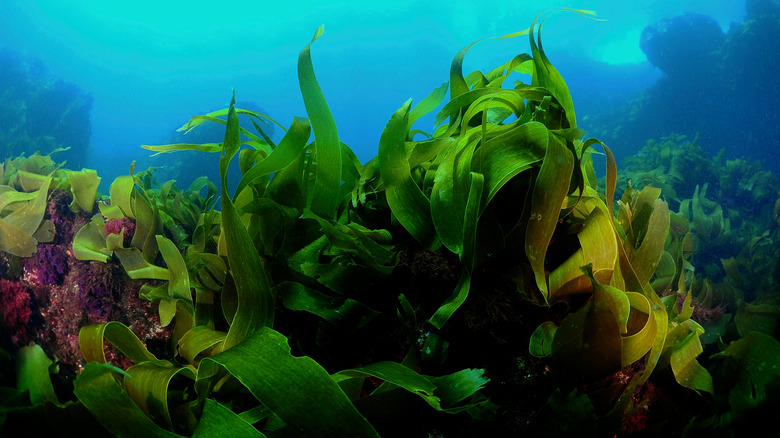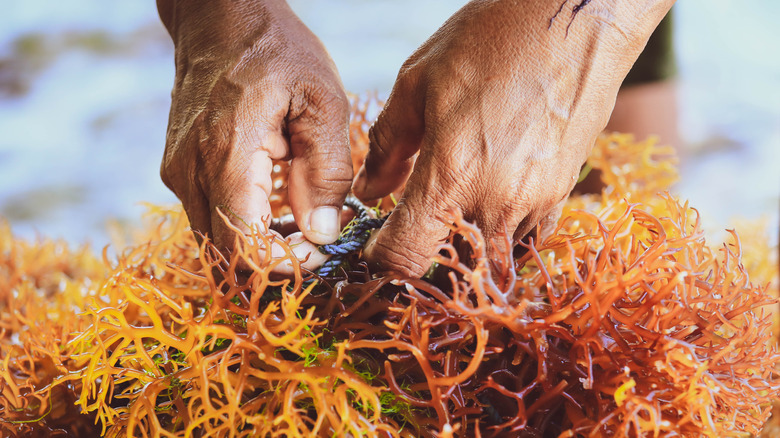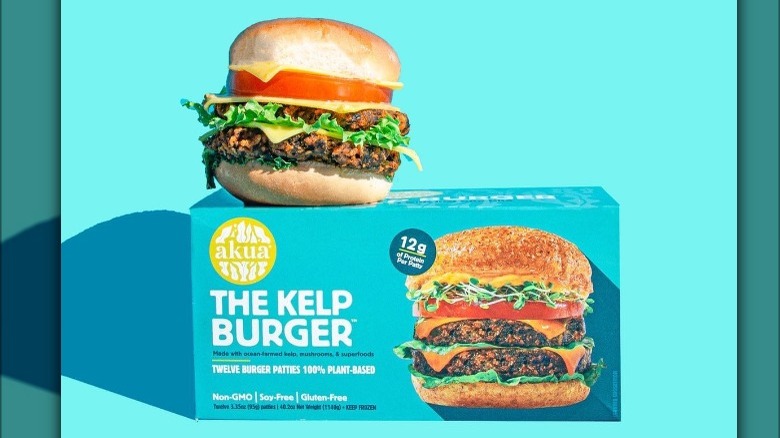Why Kelp Makes Such A Great Meat Substitute
Seaweed has been a part of East Asian diets for centuries (via Smithsonian), but only recently have the ocean veggies made their way into Western cuisine. From spirulina powders to sea moss gels, different types of seaweeds have appeared on the ever-growing list of "super foods" for their nutrient-dense profiles. But seaweeds take the "superfood" label to a new level — offering benefits that go beyond our personal needs for the betterment of the planet.
The real reason seaweed is so sustainable is because of its ability to soak up pollution and its wide range of potential uses (via Ocean Wise). From the replacement of plastic to a source of carbon-neutral fuel, seaweed could be the solution to many of Earth's climate issues. Just the act of farming seaweed has benefits that would clean up the oceans — the world's largest offset to human-made carbon dioxide — and, therefore, our greatest defense against climate change (via NOAA).
As meat alternatives gain momentum, many companies are finding ways to implement seaweed into meat substitutes. From burgers and bacon to a new source of heme (the molecule that makes meat red and contains iron), seaweed has the potential to make alternative meats even more sustainable while supporting the development of large-scale algae farming that could shape the future.
The future of kelp farming
Courtney Boyd Meyers, the founder of AKUA, a kelp-based meat company based in Brooklyn, New York, told Smithsonian Magazine: "Our ocean is one of the biggest absorbers of carbon dioxide, so kelp forests and kelp farms have a vital role to play in combating climate change and helping deacidify our oceans." According to a 2019 study published in "Current Biology," there are more than 30 million square miles of ocean suitable for seaweed aquaculture — potentially benefitting the coastlines of more than 77 different countries. However, according to the same study, the technology that's needed to farm seaweed at that scale doesn't exist.
As MIT Technology Review explains, seaweed aquaculture has become an area of interest — particularly for companies looking to invest in an effort to offset their own carbon emissions. However, there are still a lot of unknowns, and before corporations can start receiving their "carbon credits," more research is needed to understand the potential ecological implications of growing seaweed at such a scale. But that's where food companies like AKUA and Umaro Foods come in. By partnering with ocean farmers, labs, and universities, seaweed-based alt-meats are fueling the science that will allow seaweed farming to expand.
Why eat kelp-based alt meat?
From AKUA's kelp jerky and burger patties to Umaro's bacon strips, seaweed has made its way into some pretty unexpected foods. Smithsonian explains that seaweed is packed with even more protein than soybeans, which have the highest amount of protein among beans. The underwater plant is also full of hydrocolloids, or gels that are responsible for the seaweed's bouncy consistency. Thanks to these gels, kelp-based alternative meats are able to achieve fat analogs and flavor profiles that are similar to real meat while delivering antioxidants, iodine, and vitamins and minerals (via AKUA).
Not only do kelp-based meat alternatives taste good, but they do good — for you and the planet. In fact, eating one actually has positive effects on the environment. According to AKUA, the kelp used to create their burgers has actually removed more than 300 tons of carbon from the ocean in just one year. Additionally, AKUA and Umaro's work with regenerative ocean farmers, non-profit organizations like GreenWave, universities like the University of New Hampshire and the University of New England, and labs like Otherlab, means that your money is supporting the greater future of regenerative seaweed farming.


